SEO
Free SEO Analysis
SEO Services
Content Marketing Services
Local SEO
Link Building Services
Specialized SEO Services
PPC
REPUTATION MANAGEMENT
Free Reputation Management Analysis
Reputation Management Services
Review Management Services
Specialized Reputation Management Services
CEO Reputation Management
Brand Enhancement
Business and Directory Listings
Comprehensive Reputation Management Audit
SOCIAL MEDIA
Free Social Media Analysis
Specialized Social Services
WEB DEVELOPMENT
Free Website Analysis
Web Design Services
Mobile Development Services
Website Maintenance Services
Specialized Development Services
MARKETING AUTOMATION
Free Marketing Automation Analysis
Specialized Marketing Automation Services
Comprehensive Marketing Automation
INDUSTRIES
ABOUT DMA
WHITEPAPER
Hospitality Providers: Are You Your Guests’ Favorite Online Destination?
29th June 2022
Executive Summary
Search engine optimization (SEO) is what ensures that your website will “show up” when potential guests and customers do an online search
The content on your site is one of the primary ways Google’s algorithm figures out if your site is a good match for a particular search request.
Travelers, diners, and other consumers of hospitality services go online more than ever to research, make purchase decisions, and book reservations.
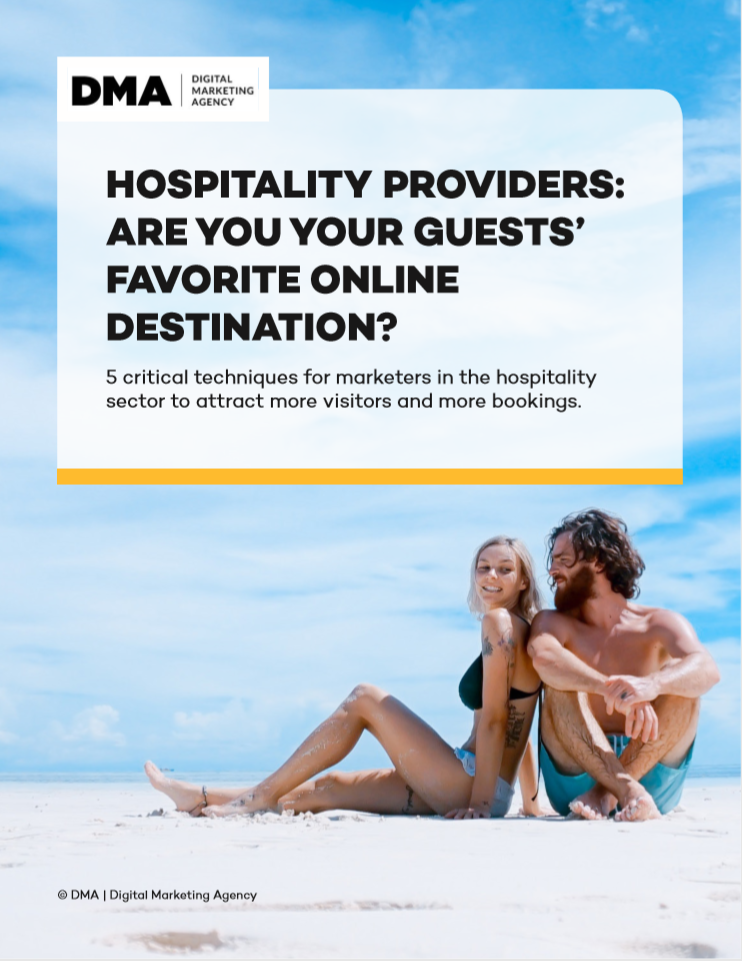
Whether planning a jaunt down the road or a holiday across the globe, consumers today start with a trip to the Internet.
In today's hyper-connected, Internet-driven world, consumers of hospitality services – which includes lodging, transportation, dining, and tourist services – can find everything they need at their fingertips simply by hopping online.
Modern consumers are more tech-inclined, travel-savvy, and service-discerning than ever. They have the knowledge and understanding of how to use the Web to find the service providers with whom they want to do business. They go online to research travel destinations, look for local businesses, read reviews about that new restaurant or hotel, book an appointment at a tourist attraction, and much, much more. In other words, at every moment in the customer journey – from discovery through research, from making a decision to booking the reservation – they’re actively online.
Consequently, if businesses in the hospitality industry want to meet their future guests and customers where they live – in an increasingly digital landscape – they must show up when their most desirable customers go online.
The only question is: will that be you?
Unfortunately, it’s a short trip to ‘no’ if your business lacks an effective online marketing plan.
But here’s the good news: by putting digital marketing best practices to work, organizations in the hospitality sector will instantly upgrade their marketing and out-compete other businesses who are slower or less adept at adopting online marketing must-do’s.
In this paper, we'll discuss the top five most important digital marketing techniques that will empower you to meet tomorrow's hospitality marketing needs today.
Start With a Solid SEO Plan
Search engine optimization (SEO) is what ensures that your website will “show up” when potential guests and customers do an online search, and in today’s extremely online world, having an SEO plan is critical. The good news: SEO can pay off handsomely when successful. If you appear on the first position of Google search results, you’ll enjoy a fantastic 33% click-through rate.[i] Further, SEO leads have a 14.6% average conversion rate, versus a scant 1.7% close rate for print ads.[ii]
Preparing and executing a comprehensive SEO plan is non-trivial, however. Over 200 separate factors – most of which are technical, behind-the-scenes elements – affect your specific search ranking. Complicating matters further, Google’s algorithm for determining your website’s placement in the search results changes 500 to 600 times per year.[iii] These updates typically represent minor tweaks only, but occasionally major changes can devastate search rankings across an entire industry. For example, many travel-oriented websites were particularly hard hit by Google’s Panda update a decade ago, losing between 20% and 70% of their traffic in the update’s aftermath.[iv]
Fortunately, the same fundamental factors also play a strong role in SEO. The table below presents the six of the most important factors that organizations in the travel, tourism, and hospitality sector need to address.
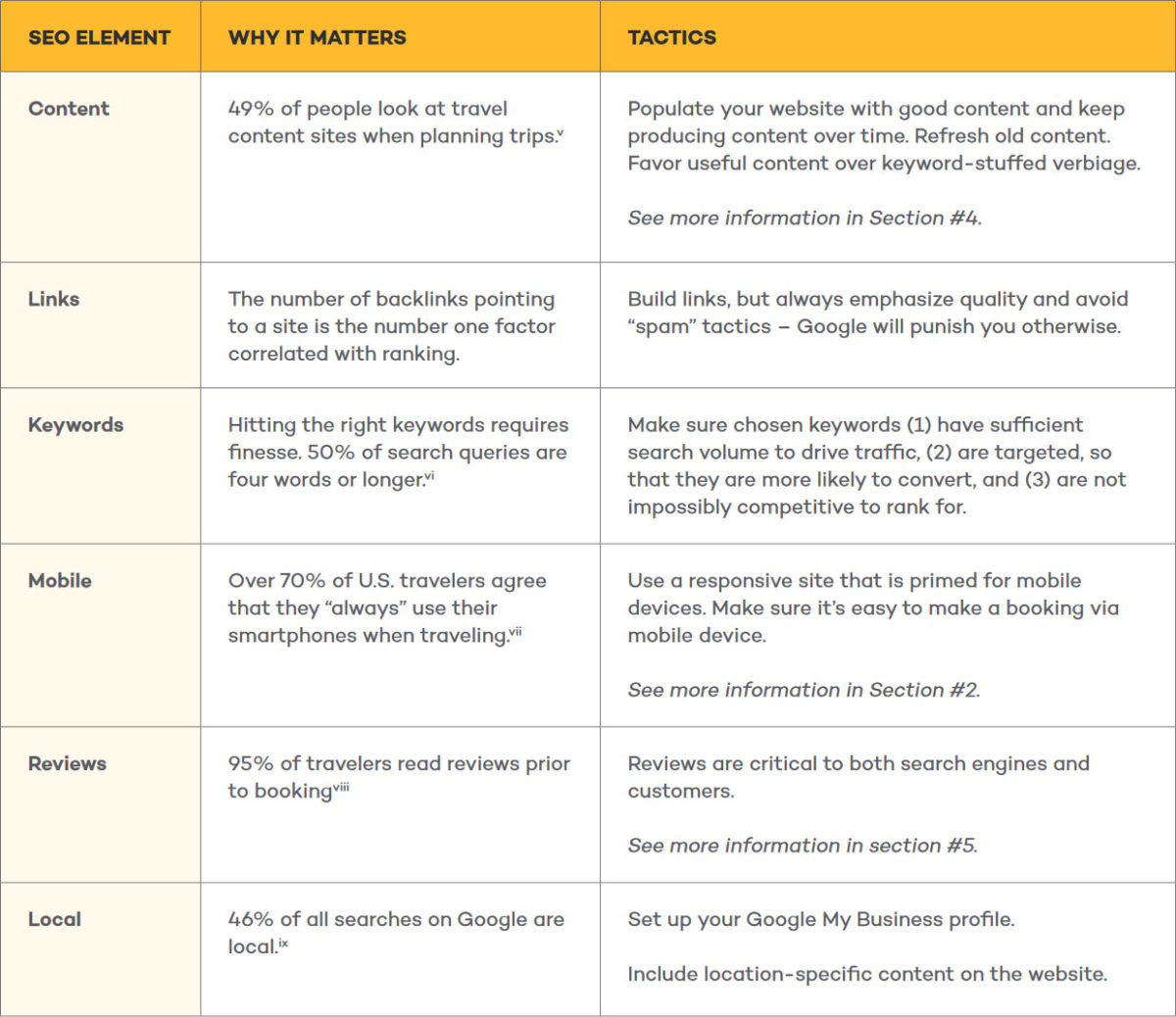
The last factor in the table above, local search, is particularly important for the hospitality industry.
Often, potential customers are looking for businesses and service providers in a specific location, and they incorporate location-specific language into their searches, e.g. they search for “hotels in Dallas, TX” or “best restaurants Phoenix, AZ.”
Local search listings work a little differently than regular search and, as a result, require some additional work. For instance, any organization that works in the hospitality industry must properly set up its “Google My Business” (GMB) profile. GMB is a tool that tells Google how you want detailed information about your business to show up in Google searches, including searches in Google Maps.
Like many SEO elements, getting GMB right does double-duty: it feeds prospective customers helpful information that can facilitate new business, and it strengthens your standing in Google searches. Specifically, your GMB profile contributes 25.12% of the weight determining whether your business appears in the Local 3 Pack, which is a Top 3 listing of local businesses that appear before organic search results during local searches.[v] That makes the Local 3 Pack extremely valuable real estate in Google search results.
You also need to geo-target your keywords. That means adding content to your website that includes location-specific information and verbiage. Thankfully, you have a lot of options here. Anything from local “neighborhood guides” to information about your business’s history could help. We’ll talk about content more in Section #3 below.
Optimize your website for mobile devices.
With a solid SEO plan in place, it’s time to reach potential guests and customers not just where they are (online) but on the specific devices they’re using (increasingly smartphones and tablets). In Q4 2017, OTAs received 45% of their bookings through mobile devices, and that percentage has only grown since.[vi] Today, more than 50% of travelers who book digitally now do so from a mobile device.[vii] Similarly, 48% of restaurant website traffic happens on smartphones, including looking up menus, reading reviews, finding locations, getting directions, and more.[viii]
This means hospitality-oriented websites need to be optimized for mobile devices. Best practices include:
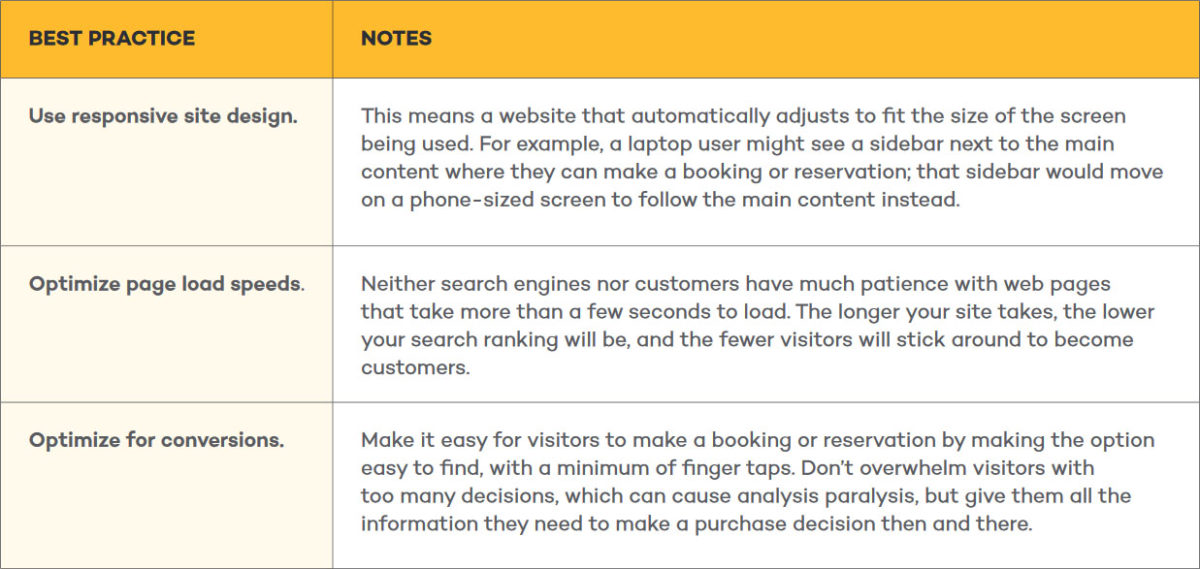
Make the Most of Micro-Moment Marketing
People are online – and typically on their mobile device – almost constantly throughout the day. Consumers spend an average of 4.7 hours each day on their smartphones and use these devices to do everything from researching interests to locating nearby businesses.[ix]
At each moment these users unlock their phones and perform a search, they have a specific goal. If your business can reach them with the right messaging at the perfect moment, you can score a new customer. Google calls this “micro-moment marketing.”
Specifically, Google's content marketing team, Think with Google, describes micro-moments as “critical touch points within today’s consumer journey, and when added together, they ultimately determine how that journey ends.”[x]
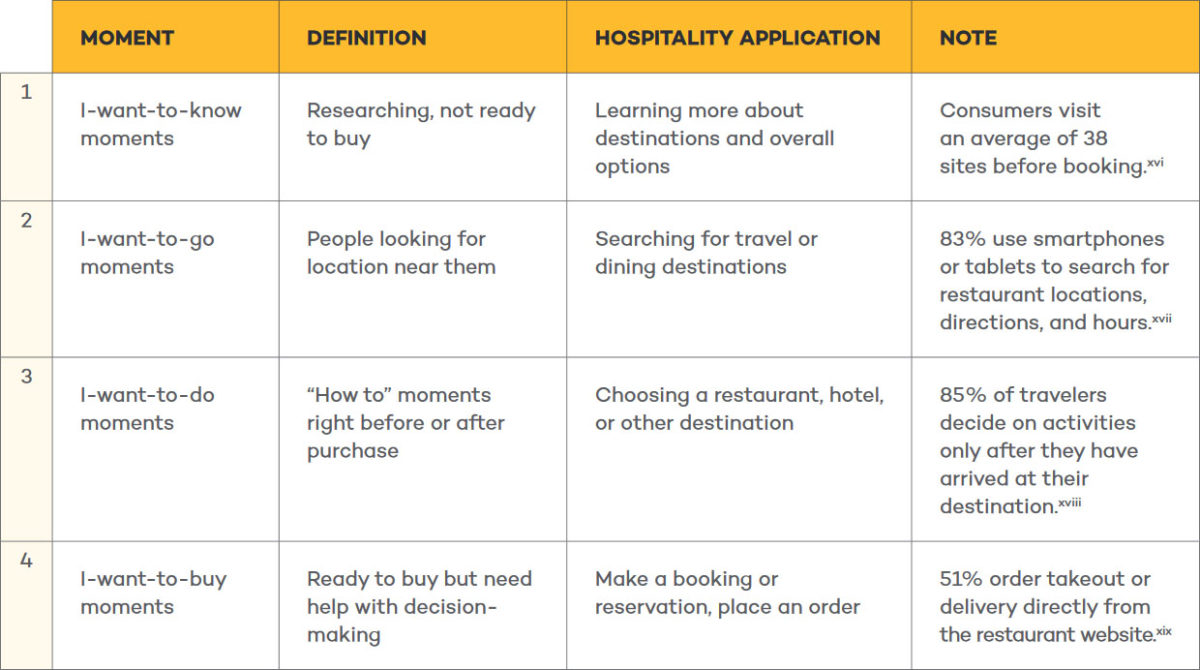
Produce Content That Appeals to Travelers and Guests
Content is especially important in the hospitality industry. Remember, Google is trying to connect its users with the exact kind of websites they’re seeking. The content on your site – including text, images, audio, video, and more – is one of the primary ways Google’s algorithm figures out if your site is a good match for a particular search request.
Then, not only must you show up in search results, once the visitor has reached your site, you must then convince them to stay and, ideally, do business with you. The best way to accomplish this feat is to feed them content that is genuinely helpful, interesting, and engaging.
Indeed, standout content is key. Competition is fierce in the hospitality industry, and most organizations in this sector have to deal not only with direct competitors (e.g., other hotels, other restaurants, etc.) but also with travel aggregators and review sites. For example, travel sites like Expedia and Orbitz have a lot of search ranking power.
All of this has major implications for keyword and content strategy: it must be comprehensive, authoritative, and offer something that visitors won’t be able to find elsewhere. Always remember, you’re not selling travel plans, hotel rooms, plates of food, etc. You’re selling a fantastic, memorable experience. Use content to help your visitors start daydreaming about their vacation, trip, or outing from the first page. Establish your property or business as a “unique experience provider” that can stand out in a crowded market.
It’s also a good idea to become a resource for destination information. That could mean providing content that informs readers about nearby restaurants, attractions, and amenities. If you’re a hotel, create a walking tour that guests can download or follow from their phones. If you’re a restaurant, write about the provenance of the meal they’re about to eat. You might take readers on a historical tour of your facility, your business, or of the region. The idea is to turn your website into an information-rich resource that can feed and enhance their experience.
As mentioned above, content doesn’t have to be limited to text. Indeed, visuals like video can be enormously powerful in the travel space, as 66% of travelers watch travel-related videos before booking their trip.[xi] A good video can gain traction even among non-travelers, with the potential to go viral. Marriott’s award-winning short film, “French Kiss,” has scored well over 6 million hits on YouTube.[xii] It “reminds you that travel should inspire and delight,” writes the Shorty Awards, which describes it as “an entertaining and professional film that subtly yet undeniably wears the Marriott brand.”[xiii]
Manage Online Reviews the Right Way
Virtually all travelers read reviews before booking their destination, and the reviews they read make a significant difference in booking decisions. A TripAdvisor survey found that 88% of travelers will not consider hotels with an average rating of less than three stars.[xiv] And here’s an often-overlooked corollary: Google reads reviews too and uses them as an important factor determining search ranking. So, if your competitor has a robust review presence online – with the quantity, frequency, and diversity of reviews that Google favors – and you do not, not only will customers be more likely to do business with your competition, your website will rank lower in search results too. Thankfully, research helps us understand how to manage reviews for businesses in the hospitality industry. See the table below for some best practices.
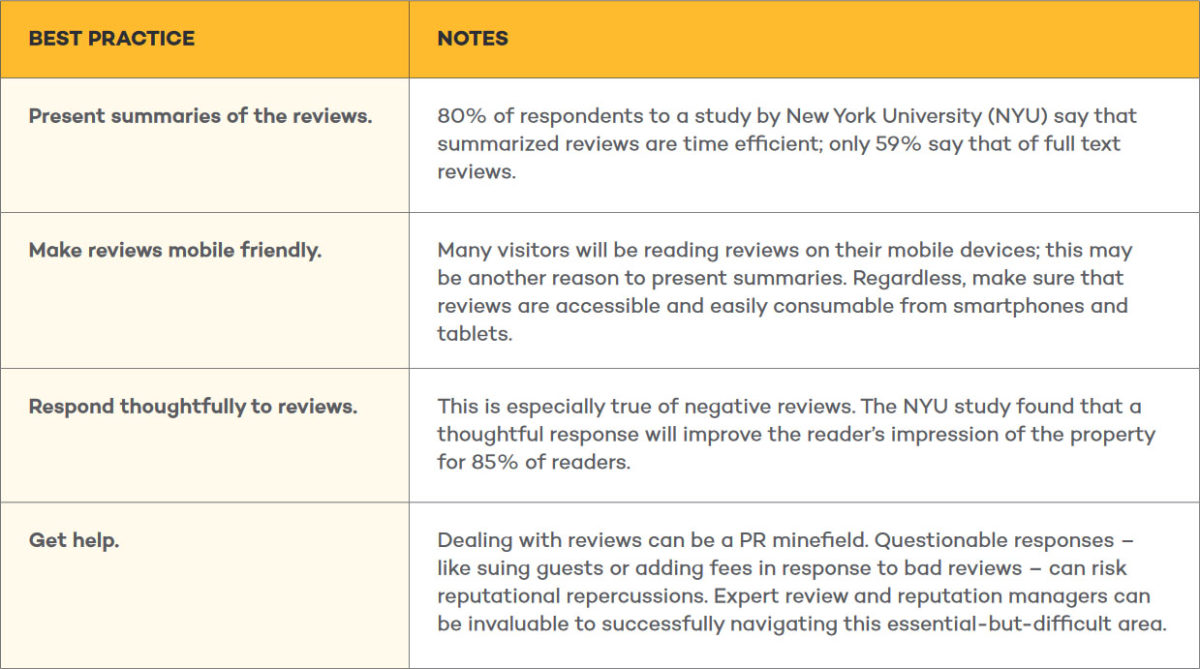
Is Your Business the Destination of Choice for Connected, Online Customers?
Travelers, diners, and other consumers of hospitality services go online more than ever to research, make purchase decisions, and book reservations. Ninety-five percent of travelers head online to read reviews. Fifty-seven percent of hotel customers book their reservations online now.[xv] Half of diners go online before booking a restaurant reservation.[xvi]
The numbers don’t lie: most of your customers travel online before they take a single step outside.
That means you need a site that (1) shows up in search results and (2) is interesting enough to get them to stick around and (3) gives them the information they need to make a booking decision.
Thankfully, the digital marketing techniques described in this paper are not nearly as difficult to put into practice as they might seem at first glance. Most of these high-power techniques do double-duty: even as they make you more visible via search engines and other information sources, they make you more user-friendly to customers, facilitating further sales. Even better, the overlap between them is significant, so you as work on one area, you’ll automatically improve others.
The only question is, will you take the steps needed to dominate the digital landscape, or leave it to other providers to eclipse you?
[i] https://searchenginewatch.com/sew/study/2276184/no-1-position-in-google-gets-33-of-search-traffic-study
[ii] https://www.searchenginejournal.com/seo-101/seo-statistics/
[iii] https://moz.com/google-algorithm-change
[iv] https://www.phocuswire.com/Three-years-on-from-Google-Panda-many-travel-sites-struggle-with-traffic
[v] https://moz.com/local-search-ranking-factors
[vi] https://www.traveltripper.com/blog/important-mobile-booking-stats-for-hotels-in-2018
[vii] http://hetras.com/post/7-essential-digital-marketing-tips-to-differentiate-your-hotel
[viii] https://about.easil.com/wp-content/uploads/124989_easil_blog_9-800x300.png
[ix] http://www.digitaltrends.com/mobile/informate-report-social-media-smartphone-use/
[x] https://think.storage.googleapis.com/images/micromoments-guide-to-winning-shift-to-mobile-download.pdf
[xi] https://storage.googleapis.com/think/docs/2014-travelers-road-to-decision_research_studies.pdf
[xii] https://www.youtube.com/watch?v=J3XVcuO1bx0
[xiii] https://shortyawards.com/8th/french-kiss
[xiv] https://www.tripadvisor.com/TripAdvisorInsights/w661
[xv] https://www.forbes.com/sites/forbesagencycouncil/2017/06/01/simplifying-digital-marketing-for-hotels/#2b88ca407b42
Our Sales team